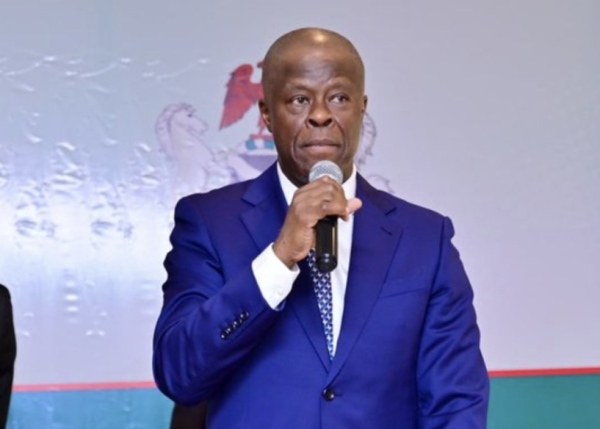•FG to fund 360,000 farmers by 2025
•Nigeria to attain 2nd largest economy by 2026 , at $400bn – Rewane
Nigeria’s Minister of Finance and Coordinating Minister of the Economy, Mr. Wale Edun, yesterday said that the economic reforms embarked upon by the present administration are yielding positive results as the country recorded a net inflow of $16.45 billion into its foreign reserve in the first seven months of the year.
The Minister disclosed this at the 2024 edition of the Access Bank Annual Corporate Forum themed: “Nigeria’s Economic Rebirth: Hopes and Implications”, in Lagos, saying that the federal government plans to fund 360,000 farmers as part of efforts to curtail the ravaging food inflation while giving the economy a rebirth.
Edun, among other things, stated: “Seventeen months or so, we rethink the reforms from the evidence, from the data, from the details that we have in our hands , the reforms are yielding fruits.
“The economy is beginning to turn a corner and I think we all are witnesses to the improved macroeconomic stability, stable exchange rates, increasing government revenue, positive and increasing trade balances, current account balances and the total reconfiguration and the revamping of government revenues as well as the greater emphasis on expenditure.
“We have relative currency stability, and of course, the all important margin of the rates. We’ve seen a gradual elimination of multiple exchange rates.
“We also have foreign exchange liquidity. The gross reserves are up. There has been a net inflow in the first seven months of this year of about $2.35 billion every month.
“On the fiscal side as well, government revenues are growing. And the key to government revenue is not so much that the government has revenue to compete with the private sector. It is the fundamentals, the social and the key infrastructure spending, the social safety net spending.
“And, historically, our figures are low. Our tax to GDP ratio is as low as 10 percent. Our revenue to GDP is also around 15 percent.”
Highlighting the various steps the government is taking to rebirth the country’s economy, he said that the government is working to ramp up crude oil production as a buffer for the fiscal revenues, adding that the country is on track to produce the targeted 2 million crude oil barrels per day (bpd) before the end of 2024.
On food security, Edun noted that the FG plans to fund 360,000 farmers with resources to cultivate on 360,000 hectares of land by January 2025.
“Apart from quickly ramping up oil production, one of the key areas is that in the agricultural sector, not just for raw output, but for putting us on the path to industrialisation, just as the way as put in as a step taken to have local refining of petroleum products what’s come back after so many decades is an important step in the road to industrialization in agriculture.
“The plan and the key target is for this dry season after a very successful dry season harvest earlier this year, there was disappointment in the wet season harvest and that’s the reason we have not completed and the result is a continued elevated level of food prices.
“So the plan this time around, and we must be determined in its succeeding, 360,000 farmers will be funded, assisted, mobilized and resourced to farm 360,000 hectares and from that we are estimating 1.4 million metric tons by next January, February when the harvest comes of maize, wheat, cassava and tubers.
“And that is a key success factor, a key indicator that we must hit as a target. And everybody has a role to play in producing food.”
On his part, Chief Executive Officer, Financial Derivative Company, Bismack Rewane, projected among other things, the country to move from the third position to the second largest economy in Sub-saharan Africa by 2026 at $400 billion from its present $368 billion.
He added: “Electricity tariff in our government will remain above $200 billion in bands A and B. Telecom tariffs will increase significantly to maintain that investment.
“There will be an efficient forex option system by 2026 and air-combact reserves will be at $20 billion.
“Inflation will continue to decline to anywhere between 19 percent and 22 percent and MPR, I think, will decline to 20 percent rather. I’m talking about June 2026.
“The Naira will appreciate from its current levels to anywhere between $1,450 and $1,500 at that time.
“‘Exchange rate will be aligned on the proper Forex system that is functioning in place due to one, integration funds, direct foreign investments and exchange rate adjustments. The trade balance will go up from $8 billion to $9 billion.
“The price of petrol will be stippled and this is at N900 per liter, the quality will be higher”.
Also speaking, Uche uwaleke, Professor of Finance and Capital Market at Nasarawa State University, said that deepening the capital requires raising the right mix of instruments.
He averred that the federal government has not been deploying the right instrument in its borrowings from the domestic capital market, saying more infrastructure bonds should be issued .
He also made a case for crypto assets adoption, arguing that youths who comprise over 70 percent of the population would find crypto assets more attractive and acceptable and hence would propel their participation in the capital market.
In his welcome remarks, Mr Roosevelt Ogbonna, Managing Director/CEO, Access Bank, said: “This is the kind of forum that we have been having since this current administration came into service in May 2023. I think in many respects it signifies the challenges that we are having as a nation and the need for us to combat the rising economic headwinds that we are facing. At least Nigeria is not isolated in this term. Many emerging markets and local markets are facing significant challenges”.


